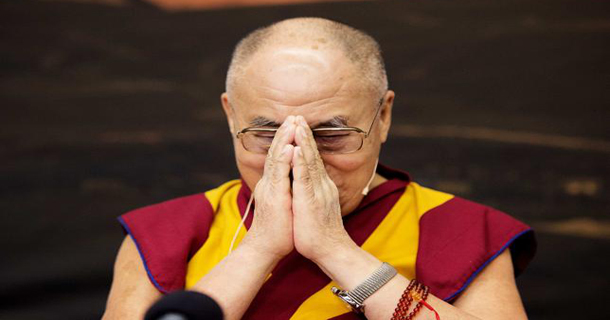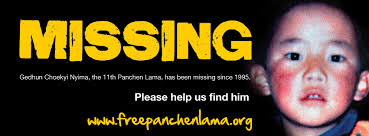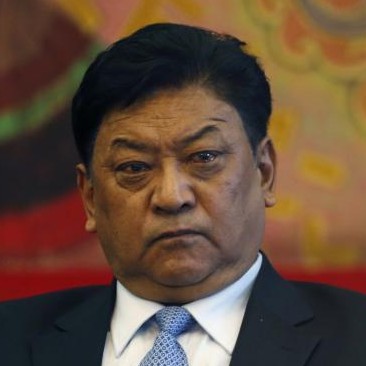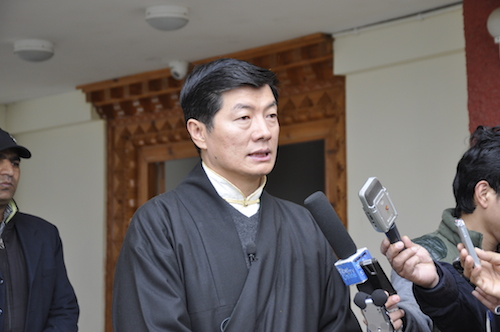
The Dalai Lama greeting audience at a conference in Copenhagen February 11, 2015.
Photo: REUTERS/CLAUS BECH/SCANPIX
The question of the reincarnation of the 14th Dalai Lama has been a matter of concern for over a decade. Traditionally the Dalai Lama will leave instructions to enable his reincarnation to be found. However, Tenzin Gyatso, the present Dalai Lama, has suggested that he might not reincarnate – a move that would end centuries of tradition and leadership for nearly 6 million Tibetans.
In an interview with German newspaper Welt am Sonntag, he said, “If a weak Dalai Lama comes along, then it will just disgrace the Dalai Lama”. He also said that if he will be reborn, he will never be incarnated in Tibet if the country is not free and no one has the right to choose his heir for political ends.
To add weight to the futility of his quest to find a successor, he knows that if the Chinese government does not approve his choice, they will selectan alternative. This was the case with the Panchen Lama, the second highest position in Tibetan Buddhism, who died in 1989. The Chinese selected his reincarnation and when the Dalai Lama made an independent choice the following year, that child was kidnapped and has not been seen since, possibly remaining under house arrest.
His Holiness’s suggestion about his own reincarnation has not been well received by China, which is demanding control over the reincarnation of the exiled Buddhist leader. Tensions over what will happen when the 14th Dalai Lama dies ignited at the annual gathering of China’s legislators in Beijing recently when Chinese officials started threatening that His Holiness must choose a successor for them to validate.
“Whether [the Dalai Lama] wants to cease reincarnation or not …this decision is not up to him. When he became the 14th Dalai Lama, it was not his decision. He was chosen following a strict system dictated by religious rules and historical tradition and also with the approval of the central government. Can he decide when to stop reincarnating? That is impossible. What he wants is to distort reality. It’s impossible in my view. Tibetan Buddhism follows tradition. If he goes ahead with this, there will be division,” said Padma Choling, the chairman of the Standing Committee of the Chinese controlled Tibet Autonomous Regional People’s Congress.
“Decision-making power over the reincarnation of the Dalai Lama, and over the end or survival of this lineage, resides in the central government of China,” added Communist Party official Zhu Weiqun.
Since 2007, the Chinese Religious Affairs Bureau has declared itself the final validator of any reincarnations of Buddhist leadership. Their argument is that the communist government is the proper guardian of the Dalai Lama’s succession through an intricate process of reincarnation – a move that is widely believed will produce a puppet leader who accepts China’s presence and policies in Tibet.
Be it a last act of defiance against the Chinese or a genuine fear of a weak 15th Dalai Lama, the 14th Dalai Lama has reserved the final decision for whether he will reincarnate until he is 90 in 2025.
Following the Beijing meeting, His Holiness told diplomats in New Delhi that if the Chinese government, which is officially atheist, was actually interested in reincarnation, they would have been seeking to recognise the reincarnations of Chinese leaders Mao and Deng rather than the Dalai Lama’s. He reiterated his stance that a reincarnation would be dependent on the wishes of the Tibetan people.
Different opinions on the matter of reincarnation have been presented worldwide. The widely-read Tibetan author and blogger Tsering Woeser feels that a decision not to reincarnate would not be beneficial for Buddhists, and that the Dalai Lama will not follow through with it.
An article by The Economist recently traced the controversy back to the appointment to office of the current Dalai Lama in 1950, claiming that the Chinese government is no expert in Tibetan Buddhism. The article called China’s policies towards the Dalai Lama “nonsense” and “preposterous” and China’s enmity towards the Dalai Lama “illogical”.
Sikyong Dr Lobsang Sangay, the prime minister of the Tibetan government-in-exile in Dharamsala, expressed his view, “It’s like Fidel Castro saying, ‘I will select the next pope and all the Catholics should follow.’ That is ridiculous. It’s none of Padma Choling or any of the Communist Party’s business, mainly because Communism believes in atheism, and religion being poisonous.”
“The person selected by the Chinese government is just as much a victim of the situation as anyone, so there’s nothing personal held against that person,” said DickiChhoyang, the head of the Tibetan government-in-exile’s Department of Information and International Relations, who feels that Tibetans are sure to reject any future putative Dalai Lama hand-picked by the Chinese government.
The BBC has said that whether the Dalai Lama will reincarnate is one of the most sensitive political issues in China, asking the question: who has authority in Tibet? They interviewed four “expert witnesses” for a broadcast on the World Service.
Chonpel Tsering, the Dalai Lama’s representative in northern Europe, says “The present … Dalai Lama, can decide. The rebirth is his choice” and goes on to say that His Holiness will consult the Tibetan people. Jia Xiudong, senior research fellow at the China Institute of international studies in Beijing, says “It’s not about the freedom of religion, It is about sovereignty – whether Tibet can remain part of China.” He continues, “When he talks about reincarnation, many people in China believe that the Dalai Lama is playing a political game.”
Robert Barnett, director of the Modern Tibet Studies Programme at Columbia University in New York, said “Nobody in the Communist Party seems to have ever considered the possibility that they could rule Tibetans without a lama to be their intermediary.” Jamyang Norbu is a Tibetan writer and activist who fell out of favour with the present Dalai Lama when he criticised his “softly softly” approach to China. Norbu says “China will have their candidate up and running…they’ll just pick some Tibetan kid who looks cute enough and…say, ‘This is the Dalai Lama.’ If we don’t have our own …then they win by proxy.”







 Print
Print Email
Email